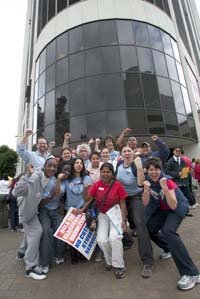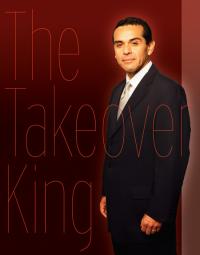
Today SF Board of Education members introduced a resolution [
Introduction of Replacement Program for JROTC] that would replace the JROTC programs in the SF Unified School District with some alternative programs to be developed by a new task force and district staff. Passing the resolution would require at least 4 out 7 votes on our school board. It will likely be voted upon on Tuesday, May 27 at our 7pm Board of Education meeting.
See
SFist blog's clever R.O.T.C in the U.S.A posting. See
SF Chronicle reporter Heather Knight's piece from this morning.
We also have 2 other very important resolutions tonight that will probably fly under the radar of Fox News and other pro-military propaganda mouthpieces of the mainstream media:
1) A new policy on
small schools by design in the SF Unified School District [thanks to June Jordan School for Equity parent and teacher leaders like Matt Alexander and SFOP and the small schools movement in SF for this]; 2) policy to
support bilingual education, Mandarin and other language immersion programs and language equality in the SF Schools [thanks to Chinese and non-Chinese parent and teacher organizations and supporters of bilingual education for bringing this forward - the resolution is posted at the bottom of this blog entry].
Below is the language for the
JROTC resolution as introduced today. Some of the language is taken from a 1995 resolution by Commissioner Dan Kelly, a co-author to Sanchez's resolution, which failed by a 4:3 vote over 10 years ago. The
coalition of teachers, parents and community organizations that have come together to support the Sanchez resolution was initiated at the
BASE to Stop the War Teach-in at Mission High School in April. For more information - contact
Sandra Schwartz of the
American Friends Service Committee in SF - 415-565-0201 ext. 12 or email her at
sschwartz@afsc.org.
Here's a link to their
resource page re JROTC in schools.
-------------
For more info on the discriminatory policies of the US Armed Services - see
"Don't Ask, Don't Tell" Revisited from Gregory M. Herek's website at UC Davis or simply check
TITLE 10. ARMED FORCES SUBTITLE A. GENERAL MILITARY LAW PART II. PERSONNEL CHAPTER 37. GENERAL SERVICE REQUIREMENTS
10 USCS § 654§ 654. Policy concerning homosexuality in the armed forces
-------------
See the
DC Anti-war network's current campaign; and
Los Angeles' CAMS work with groups like United Teachers of Los Angeles, Coalition for Educational Justice and Inner City Struggle as well. For more info on grassroots efforts to limit or replace the JROTC in schools from Chicago to Los Angeles - see
http://www.projectyano.org/http://www.rcnv.org/rcnv/co.htmhttp://www.militaryfreeschools.org/http://www.afsc.org/youthmil/default.htmhttp://www.afsc.org/youthmil/militarism-in-schools/JROTC.htmhttp://www.objector.org/recruiting.htmlhttp://www.youthandthemilitary.org/http://www.guerreroazteca.org/-------------
SFUSD Resolution Introduced May 23, 2006
Introduction of Replacement Program for JROTC--Commissioner Mark Sanchez [with Dan Kelly]
WHEREAS: It is the official policy of the San Francisco Unified School District to oppose discrimination of any kind against any group of people; and
WHEREAS: The District’s opposition to discrimination is articulated in Board Policy 5163, which provides that the San Francisco Unified School District shall not discriminate on the basis of race, religion, creed, national origin, age, sex, sexual orientation, or handicapping condition in the provision of educational programs, services, and activities, in the admission of students to school programs and activities; and in the recruitment and employment of personnel; and
WHEREAS: The San Francisco Unified School District deplores the “Don’t Ask Don’t Tell” policy of the U.S. Department of Defense, which requires the discharge of any member of the armed forces if such service member has engaged in “homosexual acts,” has revealed that s/he is a homosexual or bisexual, or the member has married or attempted to marry a person known to be of the same biological sex; and
WHEREAS: The District believes that the “Don’t Ask Don’t Tell” policy is an unjust, indefensible, unintelligent, state-sanctioned act of homophobia; and
WHEREAS: The San Francisco Unified School District cannot justify committing any funding to a JROTC program because its connection to the U.S. Department of Defense suggests that discrimination against some groups is tolerable.
THEREFORE BE IT RESOLVED: That the Board of Education of the San Francisco Unified School District calls for the phasing –out of the JROTC program of the United States Department of Defense on San Francisco Unified School District campuses; and
BE IT FURTHER RESOLVED: That the Board of Education instructs District staff to provide all JROTC units at SFUSD campuses with one year notice that the programs will be terminated at all SFUSD campuses after the 2006-2007 school year; and
BE IT FURTHER RESOLVED: That the Board of Education calls for the creation of a special task force to develop alternative, creative, career-driven programs which provide students with a greater sense of purpose and respect for self and humankind.
---------
Here's the resolution on language equality, bilingual education which will expand Mandarin and other language immersion programs in the SF Schools -SFUSD Resolution Introduced May 23, 2006
In Support of Expanding Mandarin and Other Language Immersion Programs in San Francisco Schools
- Commissioner Eric Mar [with Eddie Chin]
WHEREAS: San Francisco Unified School District has a proud history of pioneering, promoting and defending bilingual education and language immersion programs; and
WHEREAS: SF Parent, teacher and education organizations like TACT, LATA, SFABE, ACE, PIE, PPS, Mujeres Unidas y Activas, CAA, CPA, CARECEN, Californians Together and many others have long supported strengthening these programs in San Francisco; and
WHEREAS: The Board of Education in its 1999 Language Immersion Program Resolution [#911-9A7] explicitly called for the development and implementation of a comprehensive, strategic plan to strengthen and expand language immersion programs at all levels (pre-K through 12) throughout the District; and
WHEREAS: The District’s Bilingual and Language Acquisition Task Force in 2002 and Bilingual Community Council each year thereafter has recommended that the District “provide and promote opportunit[ies] for all students to develop competence in two or more languages …and a positive self-image and attitudes toward other cultures” and that the District achieve “racial, linguistic and ethnic integration throughout the District schools and classrooms”; and
WHEREAS: The District’s Multilingual Program has identified 2 of its major program goals as “enhancing multicultural sensitivity and understanding” and providing parents and students the “opportunity to choose Bilingual programs in the major languages of the school district;” and
WHEREAS: San Francisco children and families will benefit from an expansion of Mandarin and other language immersion programs because children who learn 2 languages do better in school; and
WHEREAS: Many City Government and education leaders have acknowledged that increasing our City’s bilingual population, especially in languages like Mandarin, will help improve the quality of community life, foster better economic opportunities for our families in the global economy, and enrich the multiethnic social fabric of our City; and
WHEREAS: Two-way Immersion programs are innovative early-learning models which are designed for a diverse population of English proficient students as well as for English language learners; they provide children the opportunity to develop the ability to speak, read and write in a second language and to become fully bilingual; and knowledge of more than one language and culture allows students to more fully participate in a culturally diverse society and an increasingly global economy;
WHEREAS: The District currently offers 7 elementary [5 Spanish and 2 Cantonese], 2 K-8 [Cantonese/Mandarin and Korean] and 4 middle school [2 Cantonese and 2 Spanish] immersion programs and has expanded also to the high school level in Cantonese and Spanish [2006];
WHEREAS: The District’s Mandarin Curriculum Task Force, working with parent and community members, is continuing its recruitment efforts and curriculum development for the new Mandarin 2-Way Immersion program beginning at Starr King Elementary School in the Potrero Hill neighborhood in the East Side of the City in the Fall of 2006; and
WHEREAS: Mandarin is the most commonly spoken language in the world today; it is the official language of the People’s Republic of China and spoken by 1.3 billion people throughout the world;
WHEREAS: The Mandarin speaking population in San Francisco has grown tremendously and some surveys and reports estimate that the number of native Mandarin speakers is now roughly equal to that of Cantonese speakers and even non-Mandarin speakers in the Chinese and non-Chinese communities in SF are acknowledging the growing international importance of Mandarin and other global languages like Russian and Arabic; and
WHEREAS: A recent demographic review of the Mandarin speaking student population in the District shows that they are spread throughout the City but concentrated not only in the Chinatown/NorthBeach area, but also in the Western Richmond and Sunset Districts and several Southern neighborhoods as well.
WHEREAS: National organizations like the Asia Society and some urban school districts like Chicago, Portland, and Charlotte-Mecklenburg [NC] are now promoting Mandarin and other language education programs as a critical component in preparing their students with a 21st century Education curriculum; and
WHEREAS: Our government from the federal to local levels generally lacks the resources in Mandarin, Russian and other languages to meet its diplomatic, security, economic, and social goals; and
WHEREAS: Mandarin speaking students and other English Learners who speak a language other than English at home - their “heritage language” - often suffer academically because their schools do not provide the adequate support they need to learn academic content through English, their second language; and research shows that these students could benefit from continued development of their native language which would help them develop high levels of proficiency in their native language while also mastering English; and
WHEREAS: A new parent and education group - Advocates for Chinese Education (ACE) - has delivered over 800 signed petitions to the Superintendent and Board and is seeking a demand driven “expandable” approach to improving the District ‘s Mandarin Immersion program, calling for the placement of the next Mandarin Immersion program at either the new Diane Feinstein Elementary School in the Parkside Area of the City or a school in a neighborhood with a strong demand for it, and a strategic and community-oriented process to determine future program placements; and
WHEREAS: A successful Mandarin language program in our District and City will further our position as a national leader in Chinese language education and increase our ability to acquire federal and private sector funding for language development education; and WHEREAS: San Francisco should continue its leadership role in developing a multilingual student body and workforce for the 21st
century.
THEREFORE BE IT RESOLVED: That the Board of Education of the San Francisco Unified School District is fully committed to expanding Mandarin immersion programs and other language programs in our District; and
BE IT FURTHER RESOLVED: That the District staff will develop a more thorough analysis of the Mandarin-speaking population and other language groups in our District and involve community and parent groups meaningfully in District decision-making like program development and program placement; and
BE IT FURTHER RESOLVED: That the District will continue to partner with organizations like TACT, ACE and the Confucius Institute at San Francisco State University to provide professional development opportunities for teachers and administrators and recruit highly qualified staff for our programs; and
BE IT FURTHER RESOLVED: That the District will investigate outside funding sources for the further development of our language development programs; and
BE IT FURTHER RESOLVED: That the Superintendent and staff will work with parent and community groups to develop a comprehensive and strategic plan to strengthen and expand Mandarin language immersion programs in the District and to investigate the possibility of a new Russian language immersion program, and present this plan to the Board by the last meeting in October 2006.





















